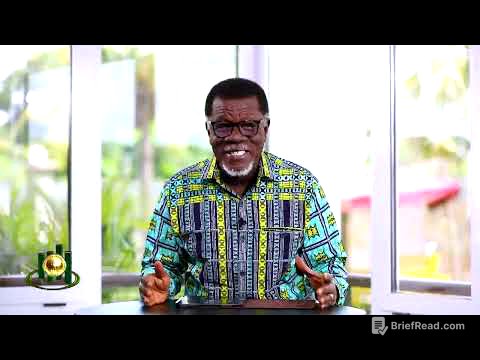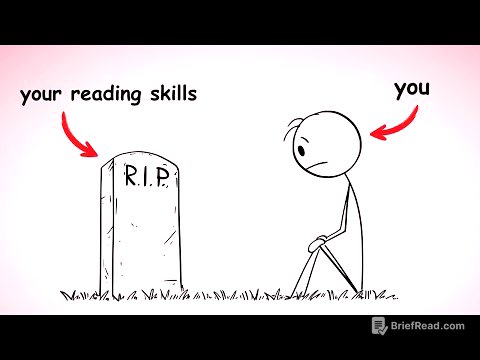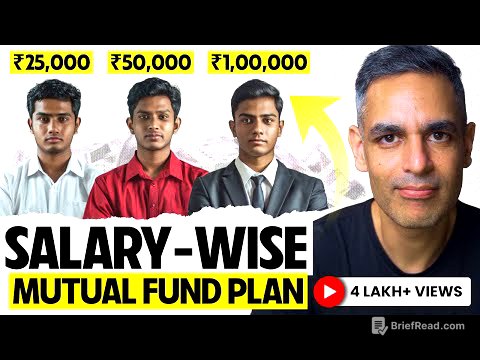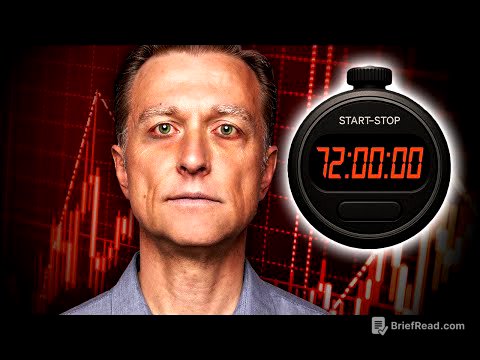TLDR;
Mark Andreessen, a visionary tech leader and investor, discusses the future of tech, the history of Western civilization, and the nature of power. He argues that the US is primed for growth due to its physical security, natural resources, and dynamic population. He criticizes the prevailing theme of demoralization and self-defeating negativity in American society, arguing that it's a choice and that people are done with it. Andreessen also discusses the concept of preference falsification, where people lie in public about their true beliefs, and how this can lead to social change. He criticizes the corruption in universities and the government, arguing that they are not fixable in their current form. He also discusses the role of censorship in tech companies and the government's pressure on them to censor certain content. Andreessen believes that the US is on the cusp of a new era of innovation and growth, driven by AI and a shift in the national spirit.
- The US is primed for growth due to its physical security, natural resources, and dynamic population.
- The prevailing theme of demoralization and self-defeating negativity in American society is a choice and people are done with it.
- The US is on the cusp of a new era of innovation and growth, driven by AI and a shift in the national spirit.
Introduction [0:00]
The conversation begins with Lex Fridman introducing Mark Andreessen, a visionary tech leader and investor who has fundamentally shaped the development of the internet and the tech industry. Andreessen is known for his co-creation of Mosaic, the first widely used web browser, and his co-founding of Netscape and Andreessen Horowitz, a legendary Silicon Valley venture capital firm.
Best possible future [1:09]
Andreessen expresses optimism about the future of tech in the US, highlighting the country's continued economic growth despite political and social challenges. He attributes this growth to factors like physical security, abundant natural resources, and a dynamic population. He believes the new administration will prioritize American energy independence and that the US is well-positioned to lead in advanced technology areas like software, AI, and biotech.
History of Western Civilization [10:32]
Andreessen discusses the book "The Ancient City" by Fustel de Coulanges, arguing that it's crucial for understanding Western civilization's origins and evolution. He explains that the book reconstructs the social structures and morality of the Indo-Europeans, who lived in a state of constant survival pressure with no modern technology. Their society was characterized by a three-part structure: family, tribe, and city, with no concept of individual rights or individualism. Their morality was based on a Master Morality, where strength was equated with goodness and weakness with badness.
Trump in 2025 [19:51]
Andreessen believes that the Trump administration's return to power could play a significant role in creating a more optimistic and pro-growth environment for the US. He argues that the previous administration's policies, characterized by excessive regulation, a negative view of progress and technology, and a general sense of demoralization, have stifled growth and innovation. He believes that the new administration will prioritize deregulation, a pro-growth mindset, and a return to individual freedom.
TDS in tech [27:32]
Andreessen discusses the phenomenon of preference falsification, where people lie in public about their true beliefs, often due to fear of social consequences. He argues that this is particularly prevalent among elites in Silicon Valley and Hollywood, who often conform to the prevailing narratives in the media and academia. He believes that this conformity is driven by a desire for status and that it creates a false sense of consensus.
Preference falsification [40:19]
Andreessen delves deeper into the concept of preference falsification, using the book "Private Truths, Public Lies" by Timur Kuran as a framework. He explains that preference falsification occurs when people either believe something but can't say it or don't believe something but must say it. He uses the example of the "parable of the green grocer" from Václav Havel's book "The Power of the Powerless" to illustrate how people in authoritarian regimes are forced to lie in public, even though they know the slogans are fake.
Self-censorship [56:15]
Andreessen discusses the role of self-censorship in society, arguing that it can be just as harmful as external censorship. He believes that people are often afraid to express their true beliefs, even in private, due to fear of social consequences. He argues that this fear can lead to a lack of accurate information about public opinion and can stifle innovation and progress.
Censorship [1:11:18]
Andreessen discusses the history of censorship on the internet, starting with his own experience in 1992 when he was asked to implement a nudity filter in a web browser. He declined, citing the technical difficulties and his unwillingness to build a censorship engine. He then discusses the evolution of censorship on social media platforms like Facebook, Twitter, and others, arguing that there is no internet service that can have zero censorship. He believes that the transition from censoring illegal content like terrorist recruitment and child pornography to censoring "hate speech" and "misinformation" was a significant shift, driven by a combination of internal pressure from employees and external pressure from the government.
Jon Stewart [1:19:57]
Andreessen highlights Jon Stewart's appearance on the Colbert Report in 2020 as a significant moment in the fight against censorship. He believes that Stewart's public questioning of the narrative surrounding the origins of COVID-19, particularly the lab leak theory, was a courageous act that helped to break the silence on the issue. He also mentions Nicholson Baker's article in New York Magazine, which further challenged the censorship of the lab leak theory.
Mark Zuckerberg on Joe Rogan [1:22:43]
Andreessen discusses Mark Zuckerberg's recent appearance on the Joe Rogan podcast, arguing that it was a courageous act. He believes that Zuckerberg's willingness to speak openly about his beliefs, including his concerns about government pressure on tech companies, demonstrates a shift in his approach to running Meta. He believes that Zuckerberg is now more willing to speak his mind, even if it means facing criticism.
Government pressure [1:31:32]
Andreessen discusses the government's pressure on tech companies to censor certain content, arguing that it has reached criminal levels. He cites the Twitter Files, the weaponization committee's investigation, and Mark Zuckerberg's own statements on the Joe Rogan podcast as evidence of this pressure. He believes that the government has violated the First Amendment and federal laws by coercing companies to censor content, and that this behavior needs to be addressed through transparency, investigations, and prosecutions.
Nature of power [1:42:19]
Andreessen discusses the nature of power, drawing on the work of Robert Michels and James Burnham. He explains Michels' "iron law of oligarchy," which argues that democracy is inherently fake and that there will always be a ruling elite. He believes that the founders of the US understood this and built a system of checks and balances to mitigate the potential for abuse of power.
Journalism [1:55:08]
Andreessen discusses the dynamics of power in journalism, using the example of Bill Ackman's public assault on Insider. He argues that journalists often wear criticism as a badge of honor, making it difficult for them to respond to legitimate criticism. He also discusses the case of the LA Times, where the owner is now challenging the prevailing narrative of the paper, leading to an internal revolt.
Bill Ackman [2:00:43]
Andreessen praises Bill Ackman's courage in publicly challenging journalists, arguing that he is a fearless individual who follows his beliefs. He believes that Ackman's actions are inspiring and that they are teaching others how to be more courageous in their own lives.
Trump administration [2:05:40]
Andreessen discusses the talent pool of the new Trump administration, arguing that it is significantly better than the first term. He believes that the administration is drawing on a deeper and richer talent pool, including people who have learned from the mistakes of the first term and are more experienced in navigating the complexities of government. He also highlights the generational shift in the administration, with many younger people in key positions.
DOGE [2:13:19]
Andreessen discusses the DOGE commission, a time-limited commission tasked with advising the executive branch on government reform. He believes that the commission's focus on three key areas: money, people, and regulations, will lead to significant changes in the US government. He highlights the commission's goal of regulatory relief, a return to a more limited government, and a focus on constitutional compliance.
H1B and immigration [2:27:11]
Andreessen discusses the H1B visa debate, arguing that while he supports high-skill immigration, he believes that the current system is flawed and that it needs to be addressed in conjunction with the DEI conversation. He argues that the current system disproportionately benefits foreign-born individuals, often at the expense of native-born Americans. He believes that the US needs to do more to develop its own talent pool and that the DEI conversation needs to be expanded to include the experiences of all groups, including white Americans, Asians, Jews, and Black Americans.
Little tech [3:05:05]
Andreessen discusses the impact of AI on the tech industry, arguing that it is creating a golden age for software development. He believes that AI coding tools are becoming increasingly powerful and that they will revolutionize the way software is created. He argues that these tools will make it easier for both coders and non-coders to build software, leading to a significant increase in the number of software jobs.
AI race [3:17:25]
Andreessen discusses the AI race, arguing that it is still too early to predict who will win. He highlights several key questions that will determine the outcome, including the role of big models versus small models, open models versus closed models, and the use of synthetic data. He also discusses the potential for AI to be used in government, raising concerns about the potential for bias and censorship.
X [3:26:15]
Andreessen discusses his own use of X (formerly Twitter), arguing that it is a valuable platform for global communication and for engaging in important social and political conversations. He acknowledges the potential for inflammatory content on the platform but believes that the longer-form essay format is a more productive way to engage in meaningful discourse.
Yann LeCun [3:29:47]
Andreessen discusses Yann LeCun, a leading AI researcher and chief scientist at Meta. He believes that LeCun is one of the smartest and most credible critics of LLMs, arguing that they are an evolutionary dead end. He uses LeCun's arguments to challenge the bullishness surrounding LLMs and to encourage deeper thinking about the limitations of the technology.
Andrew Huberman [3:33:21]
Andreessen discusses Andrew Huberman, a neuroscientist and professor at Stanford. He credits Huberman with convincing him to stop drinking alcohol, which he believes has had a positive impact on his physical health. However, he is not a fan of Huberman's sleep advice, finding it too hardcore.
Success [3:34:53]
Andreessen defines success as a combination of contribution and fulfillment. He believes that happiness is overrated and that it's more important to focus on making a meaningful contribution to the world and finding satisfaction in one's work. He argues that true fulfillment comes from a deep sense of having been useful and from being at peace with oneself.
God and humanity [3:37:49]
Andreessen discusses the role of religion in society, arguing that it's important for people to have a belief system, even if it's not a traditional religion. He believes that in the absence of a real religion, people will make up fake ones, which can lead to dangerous consequences. He argues that the "woke" movement is a form of political religion that lacks redemption and can be just as harmful as traditional religions. He concludes by expressing his openness to the possibility of God and his belief that there is much more to understand about the human psyche.
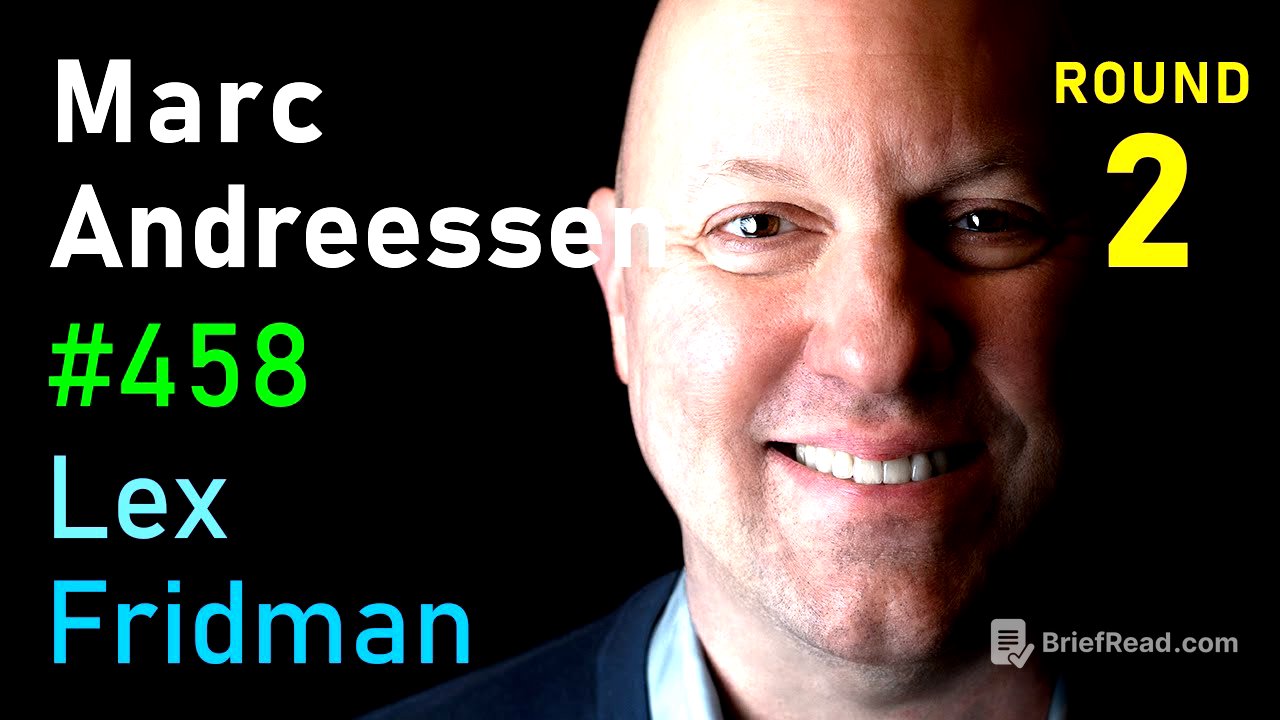

![Digimon: The Movies | Teaser trailer (Movie Collection 1) [Discotek Media]](https://wm-img.halpindev.com/p-briefread_c-10_b-10/urlb/aHR0cDovL2ltZy55b3V0dWJlLmNvbS92aS9ReGV2NUhEX1pRRS9ocWRlZmF1bHQuanBn.jpg)

